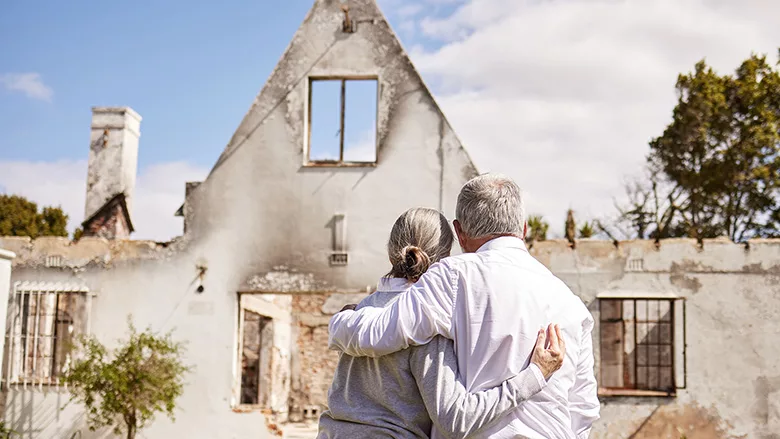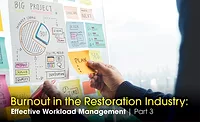Large Loss in the Restoration and Remediation industry… Are You Ready?

Photo credit: PeopleImages / iStock / Getty Images Plus via Getty Images
As a restorer, once you catch the bug, the thrill of being called to action to respond, restore, and leave an impact, it is not uncommon to want to go to the next level; the Large Loss. We could consider this the Olympics of Restoration where all your technical, soft skills, and project management abilities are challenged. For those of us who are a bit of adrenaline junkies, it is a rush.
When speaking to CAT Volumes, large loss, or commercial restoration opportunities think about the Seneca quote, “Luck is when preparation meets opportunities.” In other words, as Director of Education, Chuck Boutall, would say, “You have to be ready before you can do it!”
As restorers, we often get caught up in the urgencies of the day. If we seek the opportunity to successfully respond to a large loss, we must get ready. Tom McGuire who developed and delivers his Large Loss Mastery course all over the world was inspired to get restorers ready before the call with the big one. “Learning on the job of a Large Loss will lead to disappointment and heartache. Why would you do that to yourself when you have decades of experience with some of the largest projects ever done at your fingertips?” McGuire states. His approach based on years of large loss experience is to prepare restorers to do the job right, on time and make a profit.
As we begin to consider what we need to do, consider doing a needs analysis. Evaluate your general operations, administration, in-house skills, and resources. The following is a brief list of considerations that we compiled to help you start evaluating your needs and determine if you are ready:
-
Knowledge and Skills: Do we know what we are doing?
-
Soft Skills
- Confidence
- Communication
- Resourcefulness
- Drive for Results
- Other
-
Technical & Management Skills
- Consider the types of losses, industries, buildings, stakeholders, and the related complexities. Evaluate yourself and your team’s proficiency and seek to learn where you find gaps. Being resourceful when you have a technical expertise gap will also serve you well.
- Excellent Project Management skills are an absolute. Scheduling, planning, coordination, and documentation will need to go to a new level.
- Management and Administrative: From estimating to invoicing, managing resources, budgeting, and job costing, the team and systems must be ready to manage and support the complexities related to a large loss.
-
Resources:
- Equipment, Supplies, and Materials
- Alliances, Partners, Subcontractors, Consultants
- Finances: You are not a bank, and it is important to have the financial resources available to fund a large-scale project.
-
Soft Skills
Once you have evaluated the needs and capabilities of your organization, you can focus on next steps to get the team ready. The following is a list of considerations and tips:
- Self-Assess: Engage the team in a self-assessment to drill down on development and training needs. It is critical that the team has confidence in the skills and abilities necessary to effectively manage a large loss.
- Training and Courses: Based on the identification of skill gaps and training needs, enroll in courses. Training and courses will give you access to experienced experts, knowledge, and certificates that validate your expertise. Large Loss Mastery has developed a series that helps fill the gaps for the key roles needed to execute.
- Practice: How do you practice when you do not have the opportunity?
- Start a “What would you do if”? This is best done as a group exercise.
- What would you do if your local Museum had a fire?
- What would you do if the Court House had a major water loss?
- What would you do if the Hospital had a fire in one wing?
- When you have a loss, that may be only one or two units in a Condominium or one store in a mall; play out the scenario of it being eighty units or the entire mall.
- Look around any facility you step into and ask yourself what would you do to help the client recover from a catastrophic event? Fires, Floods, Mold, and Natural disasters happen all the time.
- Start a “What would you do if”? This is best done as a group exercise.
- Resources: The skill of being resourceful and having the right resources when the opportunity to respond presents itself is imperative.
- Internal Resources: Evaluate and train.
- External Resources:
- Existing – What do you have? Take an inventory and identify gaps.
- New Resources – What other resources, relationships, and subcontractors are needed? Build and prepare your relationships and resource lists. It is good to have multiple resources per category.
- Operations and Systems: Once you identified areas that need to be developed, make it happen. If you need to strengthen systems, administration, and documentation, doing so at the time of a large loss is not the time to address it. There are many details and the following article will give you some helpful tips: 8 Tips to Manage the Thousands of Details.
- Finances: The billing and collections processes must be sound. Always know where the money is and who is paying, Receiving your Receivables. It is also best to evaluate your banking relationships and your cash flow needs for a large loss.
- Confidence: Find confidence in your existing experiences, get training, and find experienced mentors.
When you are prepared for the moment, even if the job looks like luck to everyone else, you will know better, it was because of your dedication to having all “your ducks in a row" and being prepared for WHAT IF? HOW MUCH? AND HOW LONG? When you ask if you and your company are ready for large loss, say, “YES!” Preparation is an investment! Habit #3 of the 7 Habits of Highly Effective People, Stephan Covey, Put First Things First. “Prioritize and achieve your most important goals instead of constantly reacting to urgencies.” Put that big rock in the bowl: https://youtu.be/zV3gMTOEWt8.
May getting ready for Large Loss bring you much Restoring Success.
Looking for a reprint of this article?
From high-res PDFs to custom plaques, order your copy today!







